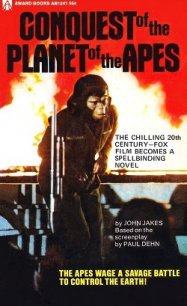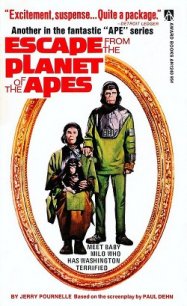Battle for the Planet of the Apes - Gerrold David (полная версия книги TXT) 📗
MacDonald climbed down past the rubble first, hoping to identify the tunnel. He sniffed the air as he moved. It smelled stale and musty; the tunnel was old and unused.
He didn’t recognize it at first, though. He stopped at an intersection and stood there frowning in puzzlement. He lit a torch and waved it back and forth, searching for some familiar or identifying mark, until finally Caesar and Virgil climbed impatiently down themselves. Caesar was brusque. “You’ve got your bearings?”
“I think so, yes. This is . . . was . . . Eleventh Avenue. Ape Management was one block east of here; the Archives Section two blocks west, at the corner of Breck Street and Ackerman. We want department 4SJ.”
“Get us there—quickly,” ordered Caesar. “Let’s go.”
MacDonald nodded and led them down one of the corridors toward a lower level.
“I was here so often,” whispered MacDonald, half to himself. “When the city was alive.”
“And existing on our labor,” snorted Caesar.
MacDonald looked at him sharply. “They paid, Caesar. They all paid.”
They groped their way along the dimly lit passage. It was damp and full of debris. The two apes wrinkled their noses in distaste, but they padded on through the rubble. The Geiger counter clicked in counterpoint.
“Dead,” muttered MacDonald, “Dead . . . dead . . . all of them dead.”
But he was wrong. Very wrong.
The city was very much alive. Perhaps not on the scale it had been nine years before, but still alive enough to be dangerous.
Down, down, farther down, buried in the bowels, deep enough even to have withstood the inferno that had raged above and leveled the rest of the city, were layer upon layer of levels, shielded by concrete and girders—the secret nerve center of the city’s control when it was alive and the center of its activity even in “death.”
The rooms and corridors were a shambles, largely destroyed, crumbling, peeling, scarred, and burned.
So were the people. Crumbling, peeling, scarred, and burned. Destroyed by the radiation around them.
Their leader was Kolp. He was fat and sallow and had watery eyes. He had been lieutenant to Governor Breck, the man who had captured and tried to kill Caesar, He was changed now, his face ravaged by time and radiation. His beard was uneven across the scars. His hands were sometimes palsied, his movements rough and painful, and his voice harsh and grating. His eyes moved constantly, searching back and forth, darting quickly from corner to corner, fearful of sudden noises and unseen assassins. He sat before a shabby, dust-covered console and manipulated its useless dials.
He was not alone. Sitting at another console was a woman named Alma. Once she had been beautiful. She still was, despite the damaging radiation. But her eyes were glazed with madness. Unable to cope with the terrible collapse of her world and everything in it, she had fled into insanity. Only occasionally did she test the waters of rationality, and each time, finding them still too fearful, she retreated once more into fantasy. It was the only response that protected her from pain and from the acceptance of death. Kolp protected her too. Kolp was strong, and she needed someone strong . . .
Kolp liked to pretend that the city was still alive; it pleased him. He made Alma play the game too—only to Alma it was no longer a game. Alma believed it because Kolp had taught her to. Yet, sometimes . . . sometimes her brow wrinkled in puzzlement. If the city was still alive, why weren’t there more people? Sometimes she questioned the thought and followed it, but she was always careful not to follow it too far. That way lay rationality and the madness that the rational world had become.
“Alma,” Kolp said suddenly. “Get me the Chamber of Commerce.”
This was one of those moments for Alma. How to solve it? Ah . . . “There’s still a chamber. Mr. Kolp. But no commerce.”
“I know that,” he growled irritably. “I just want to talk to somebody. Anybody. Isn’t there a doorman or something?”
Alma knew how to play the game. She smiled sweetly in her madness, “There’s no door. You know that too.”
Kolp made a noise deep in his throat. Sometimes Alma could be annoying. Dreadfully so.
“If the bomb hadn’t killed the old governor,” he muttered, “then boredom certainly would have. This is a ghost city. There aren’t enough people to lead. There’s nothing left but bones. I want to put flesh on them.”
“Radioactive flesh?” Alma knew what that meant. They all had taken drugs that made it possible for them to survive the intense radiation of the ruins. The drugs worked to speed up the process of regeneration, helped the ravaged flesh repair itself; the one drawback was that the genetic information was damaged. The cells divided and multiplied but not according to the body’s original plan. The drugs kept them alive; they didn’t keep them beautiful.
Kolp didn’t respond to Alma’s remark; she babbled like that all the time.
“We’re all radiated,” she was saying. “But at least we’re active.” Alma was playing word games again.
Kolp decided to cut her off. “Get me the chief of . . .”
But suddenly Alma said, “Mr. Kolp!” Her voice was frightened, like a child’s.
“Huh?” He turned to look at her.
She was pointing at her console. A tiny red light was flashing on it. “Look.”
He advanced slowly. The two peered curiously at the insistent signal. “What is it?” He searched his memory.
“It’s a signal. It’s an alert.” Old routines came flashing to memory.
“There’s somebody in the tunnels?”
She touched the console in wonderment, then flicked switches to isolate the location. “F-6,” she said.
“Alert Mendez,” snapped Kolp. “No, I’ll do it” He hurried out of the rubble-strewn command center, followed by a nervous Alma. She ran in little half-steps after him, she didn’t want to be left alone now—not at a time like this when something new was threatening her lack of rationality.
Kolp moved quickly through his underground world. His palsy vanished in his excitement, although his movements were still jerky. He crossed a balcony overlooking a work area where radiation-ravaged men and women were working at various tasks.
Some of the mutated men were trying to repair a fleet of lumbering gray military vehicles. Others were polishing and oiling weapons, putting them in readiness for what unknown battles they couldn’t guess. The women were collecting huge mounds of canned food and clothing; there were daily search parties scavenging throughout the city. The life of the underground levels was the life of the pack rat and the scavenger. Nothing was wasted, this was a society of ragpickers and tramps. They moved like zombies, with an almost mechanical efficiency, the same kind of nonvolitional activity one might associate with a beehive or an ant hill.
This huge underground vault was a partially collapsed public air raid shelter. Now it had become one of the collection centers for the salvaged remains of the city’s wealth in goods.
Overlooking the far end of the vault was another control center. This one was more extensive than the one that Kolp had made his headquarters. Mendez, Kolp’s chief lieutenant, used it for coordinating the collection and distribution of supplies. He too was marred by radiation, as were all the mutants living in the levels below the ruins. He was devoted to Kolp, slavishly so; he was happy to play at war, but even happier that there was no enemy to fight.
“Mendez!” barked Kolp, striding up to him in his control center. “Someone’s breached the warning signal at entry point F-6.”
Mendez was calm. “Must be one of our scavengers.”
“No. That entry’s locked. We’ve never used it.”
Mendez scratched his cheek thoughtfully. “The warning is still operational?”
Alma nodded eagerly.




